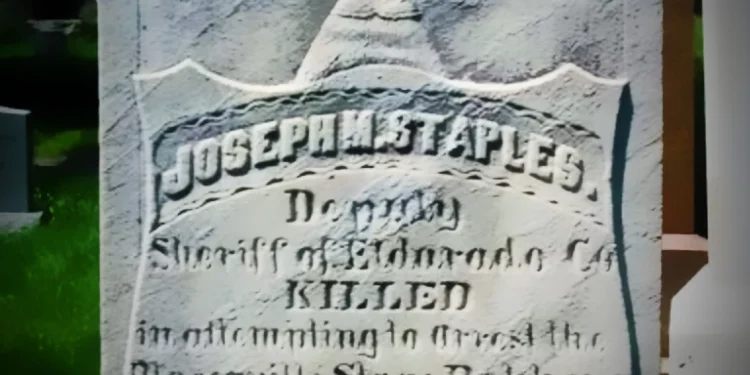By Cris Alarcon, InEDC Writer. (July 1, 2025)
PLACERVILLE, Calif. —
On the morning of July 1, 1864, a burst of gunfire echoed through Somerset as Deputy Joseph Staples, 38, burst into a hotel room shouting, “You men are all my prisoners!” Moments later, the first El Dorado County deputy sheriff to die in the line of duty was mortally wounded, his sacrifice forever etched in the county’s history.
Staples and Constable George Ranney had tracked a group of Confederate-aligned outlaws who had robbed two Pioneer Stage Line coaches near Bullion Bend the night before. The robbers, led by Thomas Poole and Ralph Henry, made off with over $40,000 in silver bullion, looted from shipments traveling west from Virginia City, Nevada, through the Sierra foothills to Placerville.
Following their brazen heist, the gang took shelter at the Somerset House, a hotel perched on the north fork of the Cosumnes River. That’s where Staples made his last stand.
“He charged the room knowing what waited on the other side,” said El Dorado County Sheriff’s historian Sgt. Eric Carter, who curated the department’s recent tribute. “He didn’t flinch—he was defending the law, and his community.”
The bandits, calling themselves Ingram’s Partisan Rangers, were Confederate sympathizers dressed in gray uniforms—a stark reminder of the Civil War tensions reaching even into California’s mining towns. Their mission, as they saw it, was to disrupt Union bullion shipments and bankroll a Western rebellion.
Constable Ranney survived the gunfight, though seriously wounded. The outlaws fled, but with a price on their heads, they were captured seven weeks later in Santa Clara County. Poole stood trial for the murder of Staples and was hanged at the Placerville Gallows on September 29, 1865. One other was sentenced to 20 years; the rest were acquitted.
Staples was buried on July 2, 1864, in the Placerville Union Cemetery. His funeral was well attended by residents from Coloma, Placerville, county officials, volunteer firefighters, and what the local newspaper described as “a large number of ladies.”
In 1916, a granite marker was erected near Pollock Pines, memorializing Deputy Staples and the dramatic events of what became known as the Bullion Bend Robbery.
His was the only death in the line of duty by gunfire in El Dorado County until Deputy Brian Ishmael was killed in 2019—155 years later.
Civil War Reaches the Sierra
California was officially a Union state, but Confederate sentiment simmered in rural Gold Rush communities. The robbers viewed themselves not just as criminals, but as agents of Southern resistance—“partisan rangers” in enemy territory.
Still, to the people of El Dorado County, the robbery was a direct assault on law and order.
Legacy of a Fallen Hero
Today, Deputy Joseph Staples remains a symbol of duty, sacrifice, and moral resolve. His name is engraved on both the El Dorado County Peace Officers’ Memorial and the National Law Enforcement Officers Memorial in Washington, D.C.
Sheriff’s deputies, local historians, and residents continue to honor his memory, recognizing that in charging that room on July 1, 1864, Staples wasn’t just enforcing the law—he was defining what it meant.
——————————————————————————-
Here is a stage play adaptation of “The Last Ride of Deputy Staples”, written as a one-act historical drama. It’s structured with period dialogue, minimal staging, and dramatic monologue, ideal for community theater or a courthouse reenactment.
“Bullion Bend: The Last Ride of Deputy Staples”
A One-Act Play in Three Scenes
Written for 2-4 actors and minimal props
CAST:
-
Deputy Joseph Staples, 38, calm, resolute, Union loyalist
-
Constable George Ranney, late 30s, dry wit, loyal friend, wounded but survives
-
Thomas Poole, 30s, charismatic Confederate-aligned outlaw
-
Narrator (optional or doubled by Ranney)
SCENE I: Sheriff’s Office, Placerville – June 30, 1864
Dim lighting. A wooden desk. A map of El Dorado County tacked behind it. STAPLES and RANNEY lean over the map.
STAPLES:
(Pointing) They hit the coaches here. Bullion Bend. Forty thousand in silver, gone. They cut the telegraph, too. Clean job—Confederate uniforms and all.
RANNEY:
Poole again? I heard he calls himself “Captain” now. Like that makes him more than a thief with a costume.
STAPLES:
(Standing tall) Doesn’t matter what flag he waves. They’re outlaws. And I’ve sworn to bring ‘em in.
RANNEY:
Then we ride tonight?
STAPLES:
We ride tonight.
They exit in silhouette.
SCENE II: Pleasant Valley House, Somerset – Morning of July 1, 1864
Simple staging: A saloon-style doorway. RANNEY and STAPLES crouch behind barrels just outside.
RANNEY:
(Whispers) Six of ‘em inside. You sure?
STAPLES:
(Checks pistol, breathes steady) I only need one chance.
RANNEY:
(Quietly, half-joking) Remind me to write your epitaph.
STAPLES:
(Looking to door) “Here lies a fool who thought justice was worth dying for.”
RANNEY:
That’ll work.
STAPLES:
Ready?
They nod. STAPLES stands and shouts into the door.
STAPLES (shouting):
You men are all my prisoners!
A deafening gunfire sound cue. Lights flash. STAPLES jerks, struck. RANNEY cries out and returns fire. The chaos lasts only a few seconds. RANNEY falls to one knee, clutching his side.
RANNEY:
(Weakly, to fallen Staples) Joe… you got him. You got Poole.
SCENE III: Placerville Union Cemetery – July 2, 1864
One grave marker. RANNEY stands in uniform, arm in sling. Spotlight.
RANNEY (monologue):
They buried Joe on a Saturday. Sheriff, blacksmith, preacher—all came. Even the ones who never liked the badge showed up quiet.
Poole swung the next year. But Joe… Joe didn’t need revenge. He needed one clean shot. And he took it.
Now when I ride past Bullion Bend and hear the wind cut through the trees, I swear I hear him—just once—shouting like thunder:
You men are all my prisoners!
(Pause)
And God help ‘em if he ever gets the chance again.
Fade to black.
TECHNICAL NOTES:
-
Set: Minimal; can be performed with a single backdrop or rotating signage (Placerville, Somerset, Cemetery).
-
Props: Two replica 1860s pistols, badges, Union deputy coats, optional Confederate attire for Poole.
-
Run time: 12–15 minutes
-
Genre: Historical drama / tribute
-
Tone: Solemn, respectful, patriotic






